Meet the ‘micro-Pacs’ buying political ads on Facebook
- Published
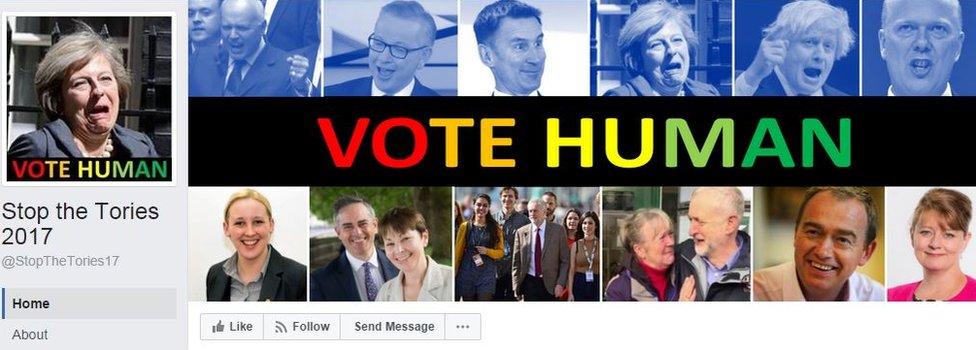
One of the pages buying Facebook advertisements is an anti-Conservative initiative led by a former Green Party communications official
Alongside the main parties, small groups and even individuals are jockeying for political influence by buying micro-targeted ads on Facebook.
They are not-for-profit organisations, small informal groups and - in at least one case - a student with a personal mission and a bit of spare cash. They're bypassing the political parties and buying political advertisements directly on Facebook.
BBC Trending and Newsnight have been asking people to send in examples of the political ads they have been seeing on the UK's biggest social network. We've seen plenty of advertising put out by the major parties, but also ones promoting about a dozen politically themed pages unaffiliated with any official campaigns.
Given the relatively small size of our sample - a few hundred people have been in touch compared to more than 30 million monthly Facebook users in the UK, external - it's likely there are many more of what we at BBC Trending are calling "micro-Pacs" (in the US, independent campaign groups are called "political action committees") than our survey has picked up.
Crowdfunding campaign
Chris Henderson runs one of these groups. He's clearly left-leaning, though some of the groups also come from the right of politics. Henderson's Facebook page is called "Stop the Tories 2017, external". Henderson is a postgraduate psychology student and a former local communications officer for the Green Party, but says that his current initiative is not endorsed by or co-ordinated with the official Green campaign.
Henderson says he's opposed to a number of Tory policies - singling out work capability assessments that were introduced as part of welfare reforms - and that he would like Conservative candidates to be defeated by opponents from the broad left, including Labour, the Lib Dems, the Greens and the Scottish and Welsh nationalists.
"I think that the landscape that we have in this election is different than anything that's been in the playbook before," he says. "The only way the Tories are going to be removed from office is through some sort of progressive alliance."
Henderson said he has spent around £1,800 on Facebook ads, initially using the site's tools to target people interested in left-wing causes, but later targeting concentrating on 18-25 year olds in marginal constituencies. He says he crowdfunded the money from around 50 people and also used personal funds.
His ads are very different from traditional party campaign material. One campaign featured a disability campaigner who was quoted saying: "If you vote Conservative on June 8th, you are voting to kill people like me."
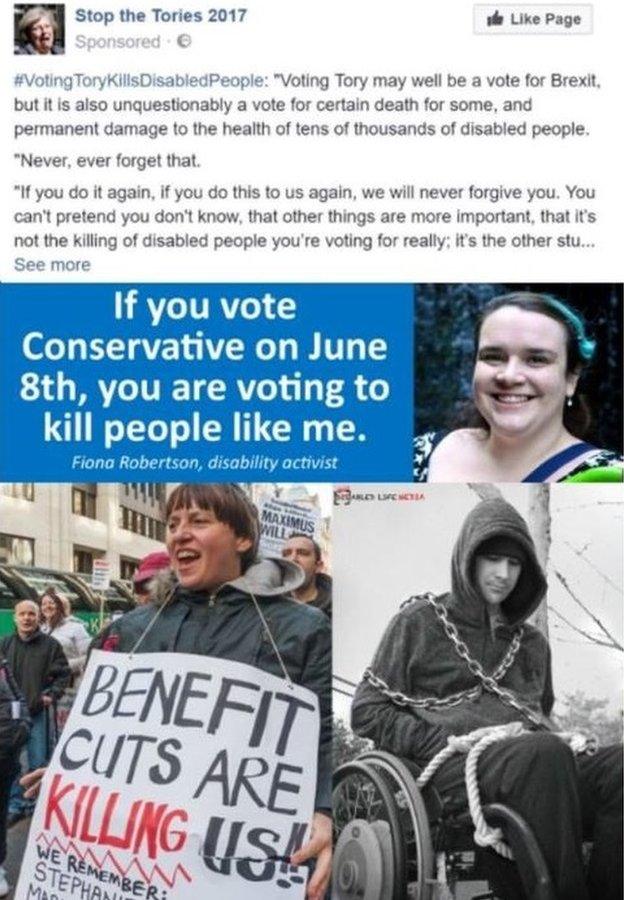
"Non-party publishers have much greater freedom to tell it like it is without the constraints of working within a political party," Henderson says. "Everybody gets to decide their own framing on social media."
Despite the relatively modest outlay, Henderson says his posts, boosted by the paid ads, have racked up around 8 million Facebook impressions.


Ladies for Davies
Labour seem to have endorsed the "DIY" approach to political advertising. Last year, the party reportedly rolled out a campaigning tool called "Labour Promote" which enabled activists to upload adverts directly to Facebook, external. Perhaps as a result, most - but not all - of the ads seen by Trending come from a left-wing or anti-Conservative perspective, but there are exceptions.
One such page is titled "Ladies for Philip Davies, external" - a group of five women who describe themselves as anti-feminists.
The Facebook group was formed, says Natoya Raymond, to support Davies, elected to represent Shipley for the Conservatives in 2015, and a critic of feminism who has argued that men's voices are being "neutered" and that their rights must be more strongly defended. He previously sat on the Women and Equalities Select Committee.
None of the five - the group includes stay-at-home mothers, a self-employed woman, a student and a full-time carer - actually live in Davies' constituency. The Facebook group was formed, by coincidence, shortly before the General Election was called. Raymond says she spent £40 of her own money to promote the page, but that the campaign was not designed to influence the vote in Davies' Shipley constituency.
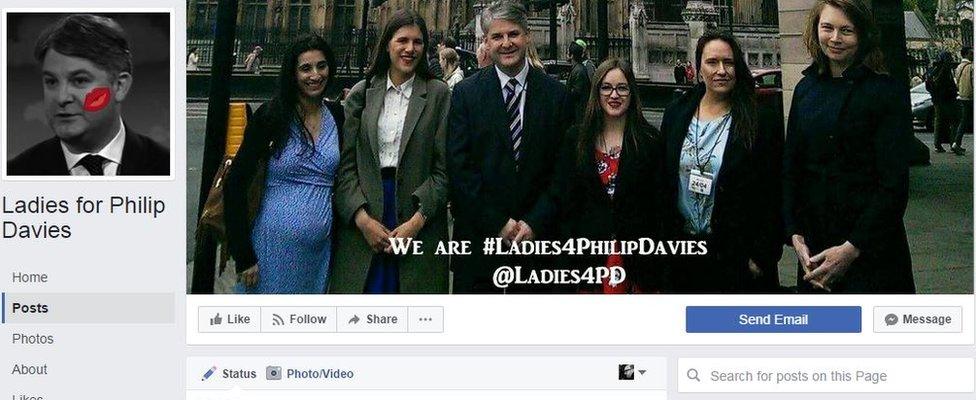
"Ladies for Philip Davies" has spent around £40 on Facebook adverts, but the group says its campaign did not specifically target the General Election
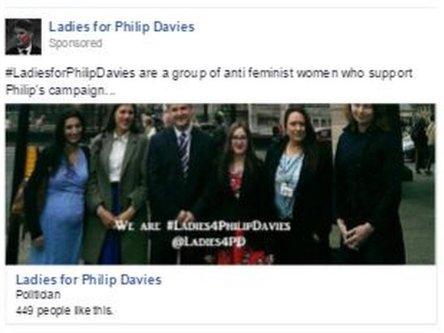
Ads for "Ladies for Philip Davies" were targeted towards people who, according to Facebook's data and algorithms, are interested in news about women's rights and men's rights.
"The reason we created the pressure group is that we are sick of him repeatedly being called a misogynist," Raymond says. "We are anti-feminist campaigners, we don't have any affiliation with any political party."
Davies tells Trending: "Ladies for Philip Davies are nothing to do with me or my campaign. Naturally I am grateful to them for their support." Other candidates running for Parliament in Shipley are Steve Clapcote, Labour; Caroline Jones, Liberal Democrat; and Sophie Walker, Women's Equality Party.
Concentrated - and anonymous - campaign
Other campaigns are much smaller and even more personal. One campaigner, who did not want to give his name for fear of attracting a backlash, has spent £40 on an ad campaign targeting his local MP, Conservative Caroline Ansell, who is defending her seat in Eastbourne.
The activist, a university student, says he and members of his family have been directly affected by polices that Ansell has voted for. He told us he had no connections to any political party.
"The cuts to tax credits and disability benefits directly affect my family members. When Caroline voted to remove bursary grants from poor university students, she burdened me with £12,000 extra debt over the course of my degree," he says.
His page is called, simply, "Do Not Vote Caroline Ansell, external" and his ads are simple text messages, with links to more information.
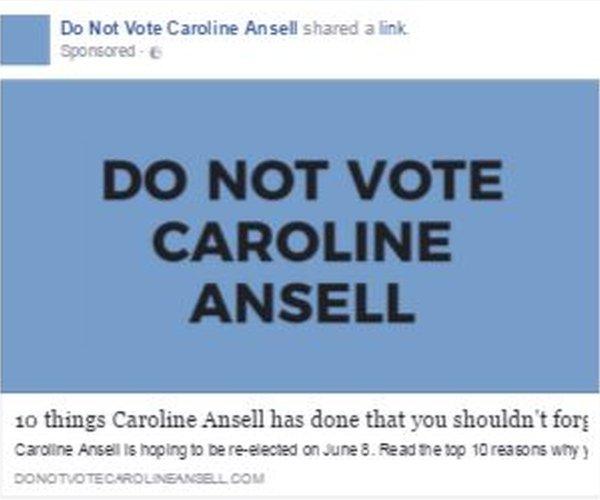
"A donation of £40 to any given political party may have paid for a few leaflets, but my online campaign has reached thousands of people. It's remarkable how much influence such a small investment may hold on the election, particularly at the local level," he says.
Trending has contacted Caroline Ansell for comment, but she declined. Other candidates running in Eastbourne are Alex Hough, Green Party; Jake Lambert, Labour; and Stephen Lloyd, Liberal Democrat.
What does election law say?
Political advertising on TV is banned in the UK, but social media advertising doesn't face the same restrictions. Campaigners outside of a political party who spend or plan to spend more than £20,000 in England or £10,000 in any of Scotland, Wales or Northern Ireland on campaign-related activities are required to register with the Electoral Commission. Just 11 groups, external have done so. None of the advertisers Trending saw are registered, but at the same time it doesn't appear that any of them would come close to reaching the financial threshold.
Most of the advertisers we've noticed are very small, but a number of seemingly larger campaigns have been run by groups from the left including Progressive Alliance, external and Collective Voice, external. There's nothing to indicate that these "micro-Pacs" are exceeding the spending limit, however.
Henderson, who runs the "Stop the Tories" page, says he follows the Electoral Commission's best practice guidelines and that his Facebook page includes a link to a site where he lists his name and address, external.
But there's no obligation on independent advertisers to do the same. He says he's concerned about the lack of regulation, but that "clearly the law in this area was drafted well before social media existed."
New political force?
The Electoral Commission said in a statement: "We continue to develop our understanding of how social media is used, and are pro-active in monitoring this type of campaigning, taking regulatory action where the rules are breached in order to ensure transparency on where money is being spent to influence voting."
Some experts think the "micro-Pac" trend could be just the start of a new political force.
"Increasingly as more and more groups, individuals and organisations are trying to get involved in politics, social media broadly is giving them a big microphone to do so," says Andrew Bleeker of Bully Pulpit Interactive, who was a top digital strategist on former US President Barack Obama's presidential campaigns. "And they can do so at the local level for very small amounts of money."
At the same time, Bleeker says: "The future of digital media is that it's very difficult to police."
"There's no ability where any kind of government in real time is going to regulate individual pieces of content, nor do I think they should," he says. "Where I've seen the line be very helpful is some sort of registration or disclaimer to say who this person is, who is behind this. Who are you for? It's really where things are unmarked and undisclosed where there's most potential for error."
Blog by Mike Wendling, external

We're still keen to get a better understanding of social media advertising during the general election.
If you spot an advert in your social media feed which looks political then please send us a screengrab or a link to the content. Please also tell us your age, gender, location (including constituency), job and general political affiliation (if you are happy to tell us). And please let us know if you're happy to be contacted by a BBC reporter.
You can send us your political messages in the following ways:
Email: electionmessages@bbc.co.uk
Tweet: @bbcnewsnight or @bbctrending
SMS or WhatsApp: +44 7380 405603
The personal data you share with the BBC (age, gender, location, job and political affiliation) will be kept confidential by the BBC and will only be used for the purposes outlined above. Please only share your personal data if your are 18 years old or over. Your personal data will not be shared outside of the BBC. The BBC will retain your personal data for the duration of the election after which your personal data will be securely destroyed. By submitting your personal information you are consenting to the BBC to hold personal and sensitive personal information about you. For more information about how the BBC handles your data please go to http://www.bbc.co.uk/usingthebbc/privacy/privacy-policy
All our stories are at bbc.com/trending.